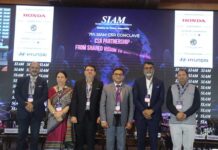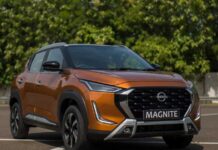
The Automotive Component Manufacturers Association of India (ACMA), the apex body of the Indian auto component industry, held its 65th Annual Session in New Delhi under the theme “Navigating Geopolitical Challenges – Creating a Resilient Automotive Supply Chain in India.” The event brought together senior policymakers, global leaders, and industry experts to discuss strategies for strengthening India’s position in global supply chains.
Key participants included Shri Nitin Gadkari (Minister of Road Transport & Highways), Shri H.D. Kumaraswamy (Minister of Heavy Industries & Steel), Shri Piyush Goyal (Minister of Commerce & Industry), and H.E. Mr. Maroš Šefčovič (European Commissioner for Trade and Economic Security), along with top industry leaders from India and abroad.
In her opening remarks, Ms. Shradha Suri Marwah, President of ACMA and Chairperson & Managing Director of Subros Ltd., highlighted the auto component industry’s resilience amid global uncertainties. She noted that the sector crossed $80 billion in FY25, with exports exceeding $23 billion—reflecting India’s growing stature as a reliable global partner. “As we face geopolitical challenges, technological disruptions, and the push for sustainability, building deeper resilience is crucial,” she said. She also emphasized the role of initiatives like the ACMA Mobility Foundation and strong government policy support in positioning India as a globally competitive hub for mobility components.
A major highlight of the session was the release of the ACMA–McKinsey Study, titled ‘Shaping the Future of India’s Auto Component Industry amid Global Trade Shifts’. The report projects the industry to reach $200 billion by 2030, fueled by strong domestic growth, rising exports, and new opportunities in both traditional internal combustion engine (ICE) components and emerging EV and connected technologies. However, it also warned of risks from tariffs, carbon taxes, and over-dependence on imports of rare earths and semiconductors.
Launching the study, Shri H.D. Kumaraswamy noted the government’s strong policy push: “Bold reforms such as the PLI scheme have already attracted over ₹29,500 crore in investments and created more than 45,000 jobs, far exceeding expectations. With the PM-eDRIVE programme giving a timely boost to e-mobility – from two- and three-wheelers to electric buses and trucks – we are ensuring clean mobility becomes accessible to all. The government remains committed to creating an ecosystem of resilience, innovation, and competitiveness that will establish India as a global leader in mobility supply chains.”
The exclusive leadership fireside chat and panel discussions that followed brought industry and policy insights into sharper focus, with participants from McKinsey & Company, Sona Comstar, Switch Mobility, VW Group India, Hero MotoCorp, Infineon Technologies, Brakes India, Bosch India, and ZF India highlighting strategies to de-risk supply chains, localize critical technologies, and enhance competitiveness.
At the valedictory session, Shri Nitin Gadkari underlined the long-term vision: “Our goal is to make India the world’s leading hub for smart, safe, sustainable, and affordable mobility by 2030. With wider adoption of clean fuels such as electricity, ethanol, hydrogen, biofuels, LNG, and CNG, alongside advances in technology and innovation, we can build a cleaner and more competitive future. The government will continue to back the industry with reforms, incentives, and infrastructure to strengthen domestic manufacturing, boost exports, and create jobs.”
Shri Piyush Goyal reaffirmed India’s growing role as a trusted global partner: “As global trade undergoes disruption, India and the EU are working towards a fair and balanced Free Trade Agreement that will strengthen our partnership for decades. The auto industry, as a torchbearer of Make in India, must now aim higher – driving innovation, resilience, and global competitiveness. The reduction of GST on auto parts to 18 percent is one such step to formalize supply chains and support growth, ensuring this sector continues to power India’s economic progress.”
Adding a global perspective, H.E. Mr. Maroš Šefčovič stressed the growing importance of India – EU collaboration: “As India’s largest trading partner, the EU already supports millions of jobs and $140 billion in trade. By combining Europe’s strengths in technology with India’s manufacturing scale, we can build resilient supply chains, drive innovation in next-generation vehicles, and advance our shared climate goals. A balanced Free Trade Agreement will be a win-win, unlocking greater market access, high-value investments, and new technologies for both regions.”
The Annual Session witnessed participation of over 1,200 delegates, including senior government functionaries, OEMs, component manufacturers, global suppliers, diplomats, and key stakeholders – underscoring ACMA’s role as the voice of India’s auto component industry and its growing relevance in international dialogues.









